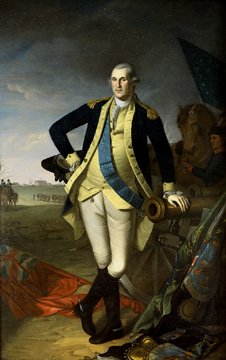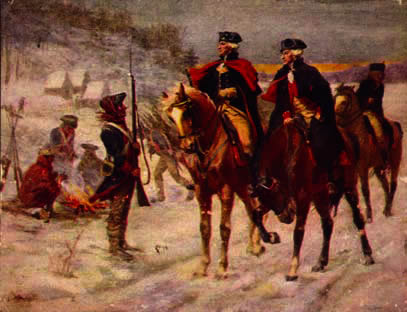This Week in History
December 22-28, 1777:
A Valley Forge Christmas:
Planning for a Brighter Future
December 2013
 General George Washington.
|
On December 19, 1777, the main column of the Continental Army reached Valley Forge, Pennsylvania. It had not been General George Washington's first choice for a winter encampment, but there were factors which ruled out other sites that were closer to towns which could help to supply the army. One of these factors was the presence of thousands of refugees from British-controlled Philadelphia, who had fled to Lancaster, York, and Carlisle and whose upkeep taxed those towns' resources.
The countryside between Philadelphia and the more western towns was dotted with iron foundries, whose products were badly needed for the army, and which had to be guarded against British takeover. The town of Lancaster, known as the "workshop of the Revolution," produced Pennsylvania rifles and clothing for the army, and thus also had to be protected.
Then, too, despite the fact that Washington commanded a tattered, often shoeless, and starving army, the Pennsylvania Legislature had sent a remonstrance to Congress, now located in York, protesting against the army going into winter quarters instead of remaining in the field. Locating the army at Valley Forge, some twenty miles above Philadelphia, would enable the Americans to keep an eye on the British Army downriver while being far enough away to prevent a surprise attack on their camp.
Although his near-victory at Germantown had impressed the Europeans with America's military potential and contributed to the possibility of a French alliance, Washington was unable to mount any further offensives that winter. He wrote that a person "might have tracked the army from White Marsh to Valley Forge by the blood of their feet."
The lack of food was so critical that a mutiny broke out among the troops on the night of December 21, and the officers had great difficulty in stopping it. As General Huntington wrote on the 22nd, "My brigade are out of provisions, nor can the commissary obtain any meat. I have used every argument my imagination can invent to make the soldiers easy, but I despair of being able to do it much longer."
 Library of Congress Library of Congress The Marquis de Lafayette was the last surviving general of the Revolutionary War. He is shown here, with his commander in chief, Gen. George Washington, at Valley Forge, 1777-78.
|
Before it recessed for Christmas, Congress gave Washington the power to send foraging parties into the countryside to seize supplies, and pay for them in money or certificates redeemable by Congress. Washington exercised the power when he arrived at Valley Forge in order to prevent the army's complete collapse, but he did not want to repeat such an action again, convinced of its undermining effects on both the citizenry and the soldiers. "Such procedures," he wrote to the President of Congress, "may give a momentary relief; but if repeated, will prove of the most pernicious consequence."
"Beside spreading disaffection, jealousy and fear among the people," wrote Washington, "they never fail, even in the most veteran troops, under the most rigid and exact discipline, to raise in the soldiery a disposition to licentiousness, to plunder and robbery, difficult to suppress afterward, and which has proved not only ruinous to the inhabitants, but in many instances to armies themselves. I regret the occasion that compelled us to the measure the other day, and shall consider it the greatest of our misfortunes if we should be under the necessity of practicing it again."
The year 1777 had been a very difficult one for General Washington and his army. There were only four thousand half-trained soldiers, and the army chest was empty of funds. Congress had difficulty obtaining supplies from the states, and made many errors of its own. Among these was the fact that it had changed the workings of the army's commissary department in the middle of the Philadelphia campaign, leading to mass confusion and a resulting dearth of supplies.
Then, too, the "Conway Cabal" was in full swing, accusing Washington of being a hesitating, incompetent commander. For his replacement, the cabal named former British officer Horatio Gates, the supposed hero of the recent American victory at Saratoga. There was no mention of the fact that the strategy for Saratoga had been designed by General Washington in concert with General Philip Schuyler, whom the cabal had succeeded in replacing before the battle began.
In spite of these problems, Washington made sure that the Valley Forge encampment was a temporary necessity that would lead to better things. The army could not sleep in their frigid tents in winter, so they built a military town of log huts with fireplaces. General Washington remained in his own tent until all the men had housing; then he established his headquarters in the small Isaac Potts farmhouse at the junction of Valley Creek and the Schuylkill River.
The soldiers' boots and clothing was rotting, and sentries appeared wearing blankets, if they had them, dressing gowns, and other odd articles of clothing. One sentry guarded his post standing on his hat, to keep his bare feet out of the snow. General Washington, in an outraged letter to Congress, wrote that the army under these circumstances was "unable to perform the common duties of soldiers."
"Besides a number of men confined to hospitals for want of shoes," he wrote, "and others in farmers' houses on the same account, we have, by a field return this day made, no less than two thousand eight hundred and ninety-eight men now in camp unfit for duty, because they are barefoot, and otherwise naked." He added that on account of the lack of blankets, many soldiers were "obliged, and still are, to sit up all night by fires, instead of taking comfortable rest in a natural and common way."
George Washington aimed his ire at those who had insisted that this army remain in the field. Those gentlemen appeared to think, he wrote, that "the soldiers were made of stocks or stones, and equally insensible of frost and snow." "I can assure those gentlemen," he continued, "that it is a much easier, and less distressing thing, to draw remonstrances in a comfortable room by a good fireside, than to occupy a cold, bleak hill, and sleep under frost and snow, without clothes or blankets."
The foreign officers who had crossed the Atlantic to fight for the American cause were amazed that the Continental Army continued to function under such conditions. But Washington did not merely fill his letter to Congress with complaints; he devoted a large section to proposing that a Congressional committee, which had already visited Valley Forge, deal with the root of the army's problems.
"We have not more than 3 Months to prepare a great deal of business in; if we let these slip, or waste, we shall be labouring under the same difficulties all next Campaign as we have done this, to rectify mistakes and bring things to order. Military arrangements and movements in consequence, like the Mechanism of a Clock, will be imperfect, and disordered, by the want of a part; in a very sensible degree have I experienced this in the course of the last Summer, several Brigades having no Brigadiers appointed to them till late and some not at all; by which means it follows that an additional weight is thrown upon the Shoulders of the Commander in chief to withdraw his attention from the great line of his duty.
"The Gentlemen of the Committee when they were at Camp talked of an expedient for adjusting these matters, which I highly approved and wish to see adopted namely, that two or three Members of the Board of War or a Committee of Congress should repair immediately to Camp where the best aid can be had and with the Commanding Officer, or a Committee of his appointing, prepare and digest the most perfect plan that can be devised for correcting all abuses, making new arrangements, considering what is to be done with the weak and debilitated regiments together with many other things that would occur in the course of such a conference, and after digesting matters in the best manner they can, to submit the whole to the ultimate determination of Congress. In fine, every thing depends upon the preparation that is made in the several departments in the course of this Winter and the success, or misfortunes of next Campaign will more than probably originate with our activity, or supineness this Winter."
 Nathanael Greene.
|
General Washington helped solve the army's supply problem by appointing Nathanael Greene as Quartermaster General. Greene scoured the countryside for food and equipment that had gone astray during the reorganization of the commissary department. He discovered large caches of abandoned matériel which he conveyed back to Valley Forge. In February, Washington rode westward toward York to meet a foreign officer who had just presented his introduction from Benjamin Franklin to Congress. This was Baron von Steuben, whom Washington assigned to teach the army the elements of military drill and maneuver.
Finally on May 5, 1778, Washington's General Orders informed the troops about the new alliance with France, an alliance which owed much to the victory at Saratoga and the army's hard fighting at Germantown. When the Continental Army marched out of Valley Forge that spring to go on the offensive, it was a proud and confident fighting force.
The original article was published in the EIR Online’s Electronic Intelligence Weekly, as part of an ongoing series on history, with a special emphasis on American history. We are reprinting and updating these articles now to assist our readers in understanding of the American System of Economy.
